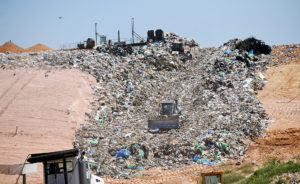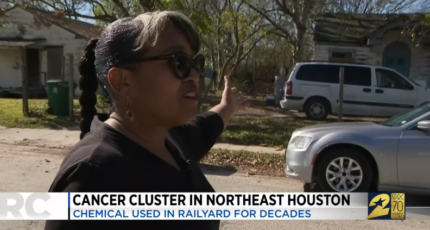The state opened and then expanded Stone’s Throw Landfill in a Black Tallassee neighborhood in the 1990s. Residents complain about a lingering stench in the air, as well as water pollution and vultures.
“You walk out of the house and you’re hit with that odor, you come home and you’re hit with that odor again,” Ronald Smith, a community activist and pastor, told Earthjustice.
Sixty-five acres of rubbish sit near Smith’s home. The wasteland reportedly includes land that used to belong to Black homeowners, who’ve since died or relocated. Although community members contacted the Environmental Protect Agency 12 years ago so that officials could investigate whether the landfill violated their civil rights, Earthjustice said it failed to address the complaint. As a result, the environmental advocacy group has filed a lawsuit against the EPA. The lawsuit also includes residents of areas in Flint, Mich., Pittsburg, Calif., Beaumont, Texas, and Chaves County, N.M. Some of these community members have waited up to 20 years to have the EPA examine their claims of discrimination.
Title VI of the Civil Rights Act of 1964 prohibits agencies that receive federal funds from race-based discrimination. This includes disparate impact discrimination in which a protected group suffers disproportionately from a policy or a decision. Because the Alabama Department of Environmental Management (ADEM) receives federal funds, it could be held accountable for granting a permit to allow Stone’s Throw Landfill to operate in a mostly Black community. If the EPA concludes that the landfill does, in fact, constitute discrimination against the African-American residents, the agency could withhold funding from ADEM until the landfill is revamped.
The EPA is supposed to respond to complaints within 180 days of receiving them, but that reportedly didn’t happen in the case of Stone’s Throw Landfill, resulting in the Earthjustice lawsuit.
But Tallassee’s Black residents shouldn’t hold their breath (as much as the air pollution might incline them to) waiting for the EPA to take action. The agency has a reputation for taking its time investigating civil rights complaints. A report released in April by NBC and the Center for Public Integrity found that “the EPA office tasked with policing alleged civil rights abuses is chronically unresponsive to complaints and has never made a formal finding of discrimination.” Given that the EPA has reviewed environmental racism complaints for 22 years, this is startling. It’s difficult to believe that over two decades, all allegations of environmental racism have been unwarranted.
The report also stated that 95 percent of the time, communities of color find that the EPA denies their allegations of discrimination. Moreover, it takes the EPA’s Office of Civil Rights about a year on average to even decide if it will investigate case.
In addition to its suit on behalf of Black Tallassee residents, Earthjustice is representing Black victims of factory farms in North Carolina. The group explains the practice as follows:
“Farmers flush gallons of hog feces and urine into open pits lined only with clay and then spray the ‘liquid manure’ onto nearby fields. The waste leaches out of the open pits and flows as run-off from the fields, polluting nearby waterways. When it’s sprayed, the fecal matter also drifts as mist onto neighboring homes, clinging to hair and clothes and forcing residents indoors.”
North Carolina’s general permit allows more than 2,000 factory farms to operate, many in Black communities. Residing near such farms can lead people to develop respiratory difficulties, irritated eyes, nausea and hypertension. African-Americans already disproportionately suffer from health conditions such as high blood pressure and asthma. Placing industrial hog farms and landfills in their communities only increases their odds of developing a health problem.
If #BlackLivesMatter to the EPA, it will begin to take complaints of environmental racism seriously.



